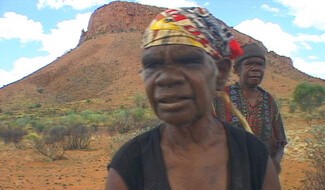Homeless in their own land

In many ways this country could not be more different than Europe. The trees, the birds, the plants and even the deep red soil are alien. Australia is like a different planet. It teems with foreign, hazardous and fascinating life. Invisible jellyfish the size of your fingernail can kill you, and that’s if you can make it past the spiders, snakes and crocodiles to the beach where the vast majority of Australians live.
But beyond the beaches lies a story of shame that is European in nature and origin and one that reminds me of our own story. You won’t find it widely talked about, but the continuing plight of Australia’s original people, the Aborigines, couldn’t be more familiar to Europe’s Romany people. It’s a story of genocide, survival, broken promises and shattered lives.
Simeon Lalara’s story is typical. At 46 years of age he has the physique of a boxer. He once killed a man in fight for which he spent 5 and a half years in prison. One hundred years ago he would have been a leader of his tribe, respected by his community and feared by his enemies. Yet today he is homeless in his own country. He and his wife Eileen have been forced to move from overcrowded housing into a tent community on the remote island of Groote Eyland in Australia’s Northern Territory.
 “In most of the homes here there are more than 20 people, with dying people in some and newborn babies too,” says Lalara. “All we want is a home of our own where we can live quietly and have a family life. We are told the government is going to build more, but we never see that happening.” Sounds familiar. But it’s not just the stories, but the numbers that are very similar.
“In most of the homes here there are more than 20 people, with dying people in some and newborn babies too,” says Lalara. “All we want is a home of our own where we can live quietly and have a family life. We are told the government is going to build more, but we never see that happening.” Sounds familiar. But it’s not just the stories, but the numbers that are very similar.
Aborigines make up about 2 percent of Australia's 22 million-strong population, have suffered inequality, ill-health and poverty since Europeans arrived more than 200 years ago. In recent decades, billions of Australian dollars have been thrown into community programs, housing and education. Yet Aborigines remain the poorest, unhealthiest and most disadvantaged minority, with an average life span 12 years shorter than other Australians. Exactly the same difference as is experienced by British Gypsies and Travellers.
Two weeks ago, the remote Northern Territory’s government was almost brought down when it became clear exactly how much money was being wasted in NOT providing homes for the Aboriginal community. The numbers would shock even the most cynical Gypsy or Traveller who have experienced a lifetime of broken promises.
In the 15 months since a “Strategic Indigenous Housing and Infrastructure Programme” had been going to build new homes, with a budget of $672 million Australian dollars (£336 million), not a single home had been built. The money had gone on consultants and meetings and was getting less each day. For one Aboriginal woman it had become too much. Alison Anderson, the labour indigenous affairs minister resigned, and very nearly brought the government down. Her criticism is powerful.
“I dreamed that I could help change things for the Aboriginal people in the bush. But after four years in the system, I know that I was wrong,” she said as she resigned. “Labour lives on the Aboriginal vote, it talks constantly about Aboriginal people, but what it is really good at is spending Aboriginal money.”
Earlier this week, A United Nations expert's harsh criticism of Australia's Aboriginal policy reopened a national debate as to how best to help the country's original settlers and most disadvantaged minority. James Anaya, the U.N. special rapporteur on indigenous human rights, said that his 12-day fact-finding tour of Australia revealed that Aborigines still suffer from "entrenched racism."
 Barbara Shaw is an Aboriginal leader who led a campaign to get the U.N. to look at what is happening in Australia. She lives in an Aboriginal settlement near the outback city of Alice Springs and met with Anaya at a U.N. meeting in New York in 2008 to express her concerns.
Barbara Shaw is an Aboriginal leader who led a campaign to get the U.N. to look at what is happening in Australia. She lives in an Aboriginal settlement near the outback city of Alice Springs and met with Anaya at a U.N. meeting in New York in 2008 to express her concerns.
"When I went to New York I found that (Americans) were shocked and amazed that Australia's government can treat people this way," Shaw said. "There are better ways of working with Aboriginal people."
Shaw said she hosted Anaya for a dinner of kangaroo in her small home last week and introduced him to community members. She shares the view of many residents in remote Aboriginal settlements: Help is needed, but the community wants a vote in how that help is administered.
"They just want the government to come and listen to what they have to say," she said. Meanwhile, the plight of Australia’s original people might gain attention in their own back yard, but much of the world remains unaware of their struggle. Like the Romany people of Europe, they are also suffering a worldwide silence that seems destined to make sure their kids live the same broken lives their parents and grandparents did.
Australia may be a world away, but its closer to home than I ever imagined.